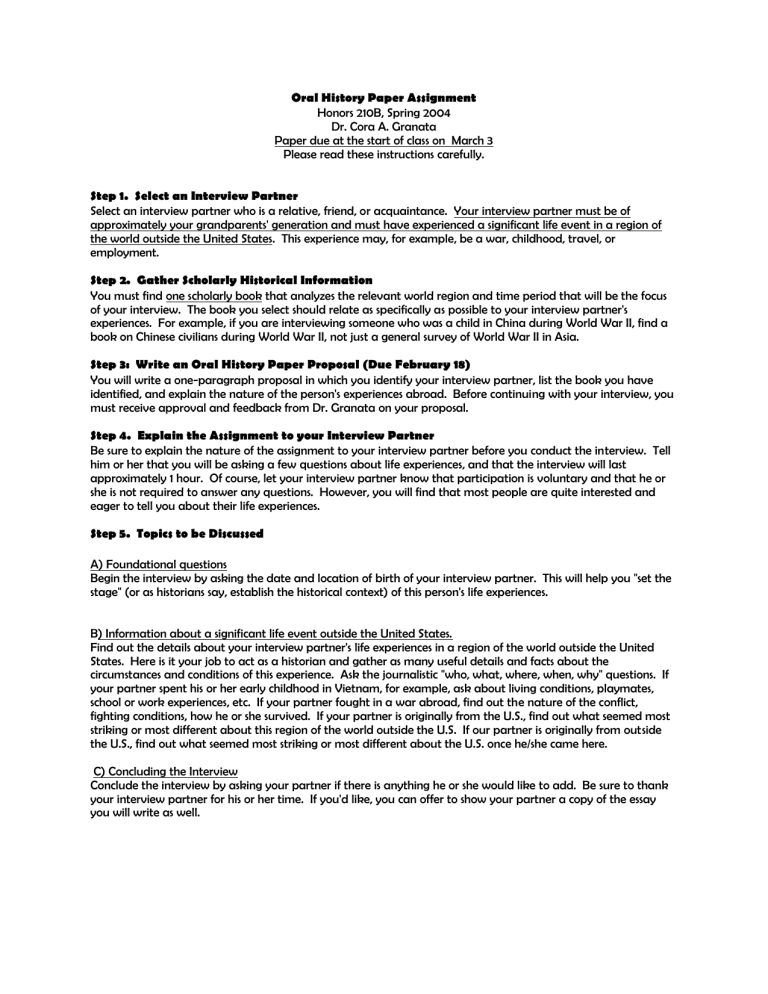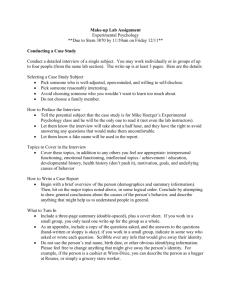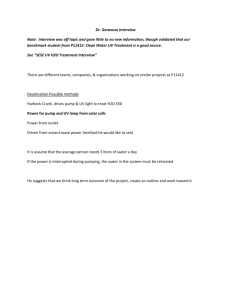Short Oral History Paper Assignment

Oral History Paper Assignment
Honors 210B, Spring 2004
Dr. Cora A. Granata
Paper due at the start of class on March 3
Please read these instructions carefully.
Step 1. Select an Interview Partner
Select an interview partner who is a relative, friend, or acquaintance. Your interview partner must be of approximately your grandparents' generation and must have experienced a significant life event in a region of the world outside the United States. This experience may, for example, be a war, childhood, travel, or employment.
Step 2. Gather Scholarly Historical Information
You must find one scholarly book that analyzes the relevant world region and time period that will be the focus of your interview. The book you select should relate as specifically as possible to your interview partner's experiences. For example, if you are interviewing someone who was a child in China during World War II, find a book on Chinese civilians during World War II, not just a general survey of World War II in Asia.
Step 3: Write an Oral History Paper Proposal (Due February 18)
You will write a one-paragraph proposal in which you identify your interview partner, list the book you have identified, and explain the nature of the person's experiences abroad. Before continuing with your interview, you must receive approval and feedback from Dr. Granata on your proposal.
Step 4. Explain the Assignment to your Interview Partner
Be sure to explain the nature of the assignment to your interview partner before you conduct the interview. Tell him or her that you will be asking a few questions about life experiences, and that the interview will last approximately 1 hour. Of course, let your interview partner know that participation is voluntary and that he or she is not required to answer any questions. However, you will find that most people are quite interested and eager to tell you about their life experiences.
Step 5. Topics to be Discussed
A) Foundational questions
Begin the interview by asking the date and location of birth of your interview partner. This will help you "set the stage" (or as historians say, establish the historical context) of this person's life experiences.
B) Information about a significant life event outside the United States.
Find out the details about your interview partner's life experiences in a region of the world outside the United
States. Here is it your job to act as a historian and gather as many useful details and facts about the circumstances and conditions of this experience. Ask the journalistic "who, what, where, when, why" questions. If your partner spent his or her early childhood in Vietnam, for example, ask about living conditions, playmates, school or work experiences, etc. If your partner fought in a war abroad, find out the nature of the conflict, fighting conditions, how he or she survived. If your partner is originally from the U.S., find out what seemed most striking or most different about this region of the world outside the U.S. If our partner is originally from outside the U.S., find out what seemed most striking or most different about the U.S. once he/she came here.
C) Concluding the Interview
Conclude the interview by asking your partner if there is anything he or she would like to add. Be sure to thank your interview partner for his or her time. If you'd like, you can offer to show your partner a copy of the essay you will write as well.
Step 6. Analyze the Interview
After you have completed the interview, it will be your job to analyze the interview. You must develop an overarching thesis about how the interview relates to information provided in your outside book. Does the interview elaborate, add new insight, confirm, or possibly contradict issues discussed in the book? Did you notice any gaps or inconsistencies in the memories of your interview partner? (For example, a scholarly book on Chinese civilian experiences during World War II might tell you about bombing, rapes, and violence, but your interview partner might avoid such topics and focus instead on her experiences in school.) What might explain these gaps or inconsistencies? Remember, you should not simply tell this person's life story. Instead, you will be analyzing the interview and making an argument.
Step 7. Draft the Oral History Paper
You will write a 3-5-page paper (approximately 750-1250 words) that analyzes your interview. Your paper must be 12-pt font with 1-inch margins.
Your paper must have an overarching thesis about how the interview relates to your outside book.
The paper must include specific quotes from the interview and from the outside book as evidence for your claims. When you submit your paper, also submit your interview tape. Be prepared to briefly present the results of your paper verbally to the rest of the class.
Some General Interview Dos and Don'ts
You should tape record the interview. You can check out a tape recorder from Pollak library, and I also have one I can loan out.
It is always a good idea to send a thank you card after the interview. This person has devoted his or her time for your research purposes.
Be sure to clearly explain the nature of the assignment and the approximate length of the interview in advance.
If your interview partner has questions, please feel free to have him or her contact me.
Never ask yes or no questions. Always ask open-ended questions that allow your partner to respond more thoroughly and freely. Feel free to ask a follow-up question if something is unclear.
Ask one question at a time. Do not cluster questions together.
It is best to interview one person, rather than a couple.
You might find it helpful to have a list of questions in front of you during the interview, but do not feel that you must follow a script. Just be sure that you touch on the themes listed above. I have purposefully not given you a list of exact questions to ask. Each interview partner will have his or her own unique experiences, and you should allow yourself the flexibility to add questions when appropriate.
Good luck, have fun, and please feel free to contact me if you have any questions!







